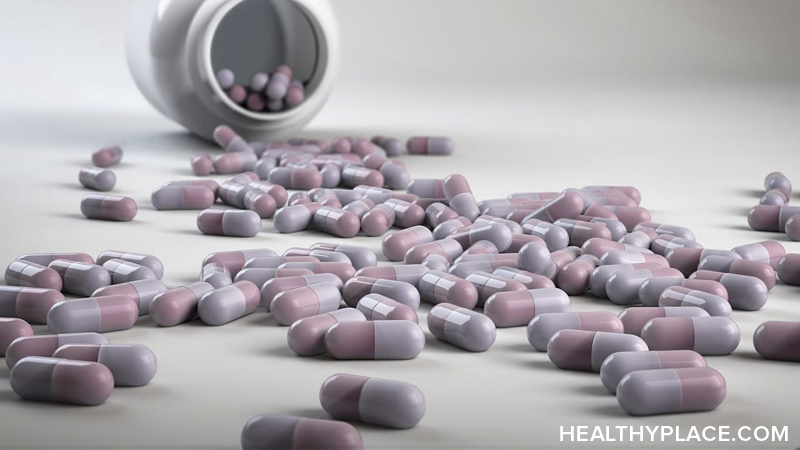MAOI Antidepressants: What are MAO Inhibitors?

Soon after scientists developed tricyclic antidepressants, another group of depression drugs rolled out of the laboratory -- the monoamine oxidase inhibitors (MAOI or MAO inhibitors). These new drugs affected the same neurotransmitters (serotonin and norepinephrine) that the tricyclics did, but they also affected dopamine.
What Are MAO Inhibitors? How do they Work?
Once the brain's three neurotransmitters, known as monoamines (serotonin, norepinephrine and dopamine), have played their part in sending messages in the brain, they get burned up by a protein in the brain called monoamine oxidase, a liver and brain enzyme.
MAO inhibitors work by blocking this cleanup activity, increasing the levels of monoamines in the brain.
Unfortunately, monoamine oxidase doesn't just destroy those neurotransmitters; it's also responsible for mopping up another amine called tyramine, a molecule that affects blood pressure. So when monoamine oxidase gets blocked, levels of tyramine begin to rise, too. Excess tyramine can cause a sudden, sometimes fatal increase in blood pressure so severe that it can burst blood vessels in the brain. In those who take MAOIs, excessive tyramine levels are controlled by dietary restrictions.
List of MAOI Drugs
- Isocarboxazid (Marplan)
- Phenelzine (Nardil)
- Tranylcypromine (Parnate)
Who Takes MAOIs?
If you have atypical depression,
- you're sensitive to rejection
- overeat and oversleep
- feel anxious and react strongly to your environment
you may respond very well to MAOIs, which can reduce the sensitivity that causes you to feel so easily hurt or rejected. Others who tend to respond very well to MAOIs can feel quite depressed, but they're able to surface from the morass of their depression from time-to-time and experience pleasure before plunging into depression again.
Who Shouldn't Take MAOIs?
Because an MAOI can affect many chemicals in the brain, there are a number of contraindications. People who shouldn't take MAO inhibitors include those with:
- Serious heart problems
- Epilepsy
- Bronchitis
- Asthma
- High blood pressure
- An aversion to following a stringent diet
In addition, isocarboxazid (Marplan) may be too stimulating if you're hyperactive, agitated, or schizophrenic. Studies suggest that phenelzine (Nardil) may not be as effective if you are severely depressed.
Dietary Restrictions When Taking MAO Inhibitors
In order to control the amount of tyramine in the body while taking MAOIs, do not consume the following foods containing tyramine unless advised otherwise by a doctor:
- Aged or fermented foods
- Alcoholic beverages (especially Chianti, sherry, liqueurs, and beer)
- Alcohol-free or reduced-alcohol beer or wine
- Anchovies
- Bologna, pepperoni, salami, summer sausage or any fermented sausage
- Caviar
- Cheeses (especially strong or aged varieties), except for cottage and cream cheese
- Chicken livers
- Figs (canned)
- Fruit: raisins, bananas (or any overripe fruit)
- Meat prepared with tenderizers; unfresh meat; meat extracts
- Smoked or pickled meat, poultry or fish
- Soy sauce
While on MAOIs, these foods may be eaten in moderation:
- Avocados
- Caffeine (including chocolate, coffee, tea and cola)
- Chocolate
- Raspberries
- Sauerkraut
- Soup (canned or powdered)
- Sour cream
- Yogurt
Before Taking MAOIs
Your doctor will probably quiz you about a range of medical conditions before prescribing an MAO inhibitor. It's especially important to tell your doctor if you have:
Frequent headaches or chest pain
- Diabetes mellitus
- An alcohol problem
- Heart or blood-vessel disease
- Liver or kidney problems
- Parkinson's disease
- An overactive thyroid
MAOI Side Effects
The one thing you've got to watch out for with these drugs is that sudden spike in blood pressure called a "hypertensive crisis" (also called the "cheese reaction") that we discussed at the beginning of this article. As long as you note the MAOI foods to avoid, you can avoid this risk.
The symptoms of a severe spike in blood pressure due to tyramine and MAOIs include:
Severe headache radiating to the front of the head
- Stiff and/or sore neck
- Nausea and vomiting
- Sensitivity to light
- Dilated pupils
- Sweating (sometimes with fever or with cold, clammy skin)
- Chest pain or heart palpitations
A blood pressure rise usually occurs within several hours after taking the drug. Stop taking MAO inhibitors immediately if you get a severe headache or palpitations and then call your doctor.
Other MAOI side effects that should be checked by a doctor include:
- Severe dizziness or light-headedness, especially when arising from a sitting or lying position
- Diarrhea
- Pounding heart
- Swelling of feet and/or lower legs
- Unusual excitement or nervousness
- Dark urine
- Fever
- Skin rash
- Slurred speech
- Sore throat
- Staggering walk
- Yellow eyes and/or skin
You can learn more about how to manage antidepressant side effects here.
There is also a range of less serious MAOI side-effects. Like all antidepressants, the MAOIs are capable of inducing a manic state in people who have bipolar disorder and may cause memory problems.
Other possible side effects of MAOIs include:
- Feeling drugged and sluggish
- Fainting and/or dizziness, particularly on standing up
- Drowsiness
- Blood sugar levels changes, particularly a concern for diabetics
- Sexual problems such as delayed orgasm
- Weight gain
MAOI Interactions with Other Drugs
While aspirin, acetaminophen (Tylenol) (plain), ibuprofen (Motrin) or antibiotics are safe when combined with an MAOI, you should check with your doctor before taking any other medicine.
Alwaysbe sure to tell your doctor or dentist that you're taking MAO inhibitors before any kind of surgery, dental treatment or emergency treatment -- even if you stopped taking the drug up to two weeks prior. The anesthesia combined with the MAOI can cause a drop in blood pressure or other problems. You may want to carry an ID card noting that you're taking this medicine.
Other drugs that can cause potentially fatal MAOI interactions include:
- Other antidepressants
- Antipsychotics
- Cold, cough, sinus, allergy, antihistamine medications
- Weight-control pills
- Asthma drugs
- Blood pressure medication
- Pain medication
- Anticholinergic medication such as Ditropan
- Heart medications
- L-Dopa
- Flexeril
- Symmetrel
- Tryptophan
- Insulin
- Cocaine
- Amphetamines
MAOI Overdose
The MAO inhibitors are somewhat more dangerous drugs than other antidepressants when taken in excessive amounts -- far more so than newer drugs such as fluoxetine (Prozac). Symptoms of overdose include severe anxiety, confusion, convulsions or seizures, cool clammy skin, severe dizziness, severe drowsiness, fast and irregular pulse, fever, hallucinations, severe headache, high or low blood pressure, muscle stiffness, breathing problems, severe sleeping problems, or unusual irritability.
MAOIs and Pregnancy and/or Breast-feeding
As with most antidepressants, safe use of MAO inhibitors during pregnancy hasn't been established, but one limited study in humans did suggest an increased risk of birth defects when MAOIs are taken during the first trimester. MAOIs are considered risky to the fetus and should be avoided when possible; both when pregnant and when breastfeeding.
MAOIs and the Elderly
Older patients are usually more sensitive than younger adults to MAO inhibitors, and they may be more likely to experience dizziness or light-headedness. Because of the danger of an abrupt increase in high blood pressure (hypertensive crisis), the MAO inhibitors are often not prescribed for people over age 60, or for those with heart or blood vessel diseases.
APA Reference
Tracy, N.
(2022, January 4). MAOI Antidepressants: What are MAO Inhibitors?, HealthyPlace. Retrieved
on 2024, June 20 from https://www.healthyplace.com/depression/antidepressants/maoi-antidepressants-what-are-mao-inhibitors



